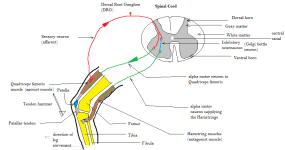DBT
Contributor
Again, your conclusion: ''Therefore, for all we know, what somebody does may be determined by the conscious mind of this person'' - implies that conscious mind itself may have the ability to determine what somebody does
This contradicts your premises; ''somebody's conscious mind may be the state of a group of neurons in this person's brain'' and ''What somebody does is determined by the state of a group of neurons in this person's brain'' because your premises point to brain/neuronal agency for conscious mind, therefore brain state/condition/agency as the determining factor for how someones conscious mind is being expressed, including all consequent actions...not the conscious mind.
You can't have it both ways, that it is neural networks determine mind and action, and that mind inexplicable has the power of determining a persons actions
It also implies a division between the person and his mind and brain. There is no division. The brain is the sole agent of cognition and action.
Your conclusion is something that Mr Untermensche himself could have wrote, that being his belief.
Never mind.
EB
Fine.


